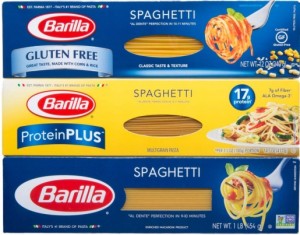August 2, 2016
 Last Thursday, four New York City residents commenced a federal lawsuit and prospective class action against the world’s leading pasta maker, Barilla S.p.A., and its subsidiaries Barilla America, Inc. and Barilla USA (collectively, “Barilla”), alleging that Barilla engaged in deceptive “slack-fill” to deceive consumers as to the amount of pasta in its boxes.
Last Thursday, four New York City residents commenced a federal lawsuit and prospective class action against the world’s leading pasta maker, Barilla S.p.A., and its subsidiaries Barilla America, Inc. and Barilla USA (collectively, “Barilla”), alleging that Barilla engaged in deceptive “slack-fill” to deceive consumers as to the amount of pasta in its boxes.
Should food manufacturers be concerned about their product packaging?
Barilla’s Product Packaging
Barilla has introduced a variety of specialized pastas in recent years to complement its traditional offerings, including gluten-free, whole grain, high-protein and “white fiber” variations.
According to the Plaintiffs’ Complaint, although the volume and net weight of Barilla’s pasta boxes varies between varieties, each box of a given Barilla pasta (e.g., spaghetti) appears to be the same size when displayed on the supermarket shelf.
Barilla Sued for Allegedly Deceptive Slack-Fill
On July 28, 2016, Alessandro Berni, Giuseppe Santochirico, Massimo Simioli, and Domenico Salvati sued Barilla in the U.S. District Court for the Eastern District of New York (Case No. 1:16-cv-04196) for engaging in allegedly deceptive “slack-fill” – the practice of including excessive, non-functional empty space in product packaging – purportedly in violation of New York’s unfair and deceptive practices statute. The lawsuit claims that Barilla sells certain boxes of pasta that are up to 25% empty, despite the fact that those boxes appear to contain the same amount of pasta as boxes of Barilla’s traditional pasta.
The Plaintiffs are seeking class certification on behalf of “[a]ll purchasers of Barilla ‘Gluten Free,’ ‘Whole Grain,’ ‘ProteinPLUS,’ and ‘White Fiber’ pastas who purchased the products for personal, family, or household use.”
How Risky Is Your Product Packaging?
Regulatory agencies, such as the Food and Drug Administration (FDA), Federal Trade Commission (FTC) and various state attorney general’s offices, monitor manufacturers’ use of slack-fill and may take action against violators. Likewise, as the above-referenced case demonstrates, class action plaintiffs seek out and target manufacturers with allegedly non-compliant slack-fill practices. As such, manufacturers’ product packaging, marketing and related business practices should be carefully reviewed by an attorney experienced with consumer product law and class action litigation.
If you would like to learn more about this topic, or if you have been served with legal action in connection with product manufacturing or slack-fill, please e-mail us at info@kleinmoynihan.com or call us at (212) 246-0900.
The material contained herein is provided for informational purposes only and is not legal advice, nor is it a substitute for obtaining legal advice from an attorney. Each situation is unique, and you should not act or rely on any information contained herein without seeking the advice of an experienced attorney.
Attorney Advertising
Related Blog Posts:
L’Oreal Settles Deceptive Advertising Suit with the Federal Trade Commission
Subway Settles Sandwich Length Deceptive Trade Practices Lawsuit



